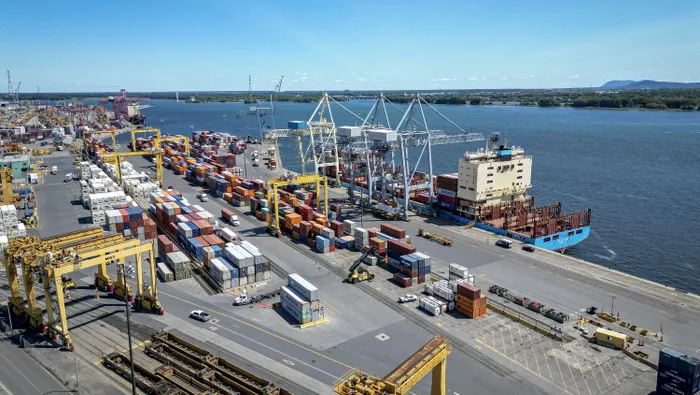
Favourable sectors, such as prepared foodstuffs, precious metals, and vehicles, aircraft and vessels, recorded trade surpluses, indicating strength. Conversely, substantial deficits arose in sectors like mineral products and machinery, suggesting a precarious balance that may be further tipped by new tariffs.
Image: Andrej Ivanov / AFP
The South African Chamber of Commerce and Industry (Sacci) has raised alarm over the potential implications of a sweeping 30% tariff imposed by the United States on South African exports.
Sacci on Wednesday said this initiative poses a significant threat not only to the nation's economy but also to the sustainability of long-term business relations between the two countries.
Sacci said the backward linkage effects for the South African economy of changing foreign trade relations will be larger than the initial effect on trade export volumes.
The type (categories) of exports and the sectors affected will also play a role in how it impacts economic growth and employment in South Africa.
This comes as the International Monetary Fund (IMF) has projected South Africa’s real economic growth for 2025 and 2026 at a modest 1% and 1.3%, respectively.
This cautious forecast aligns closely with insights from the South African Reserve Bank, which, during its Monetary Policy Committee (MPC) meeting last month, echoed these growth predictions at 0.9% for 2025 and 1.3% for the following year.
Sacci said that the inherently open nature of South Africa's economy—where exports contribute around 32% to the national output—underscored the urgency of nurturing and maintaining stable global business relationships.
Over the first half of 2025, exports to the US from South Africa constituted a notable 7% of total merchandise exports, highlighting the critical position that the US markets hold for local businesses.
However, Sacci said the sector-specific implications of a blanket 30% tariff suggested a diverse landscape of challenges ahead.
Sacci said the effect of the US tariffs and the uncertainty it creates, with a possibility of negotiating lower tariffs to soften the impact on the economy, should be resolved urgently.
Favourable sectors, such as prepared foodstuffs, precious metals, and vehicles, aircraft and vessels, recorded trade surpluses, indicating strength. Conversely, substantial deficits arose in sectors like mineral products and machinery, suggesting a precarious balance that may be further tipped by new tariffs.
With an overall accumulated favourable trade account balance of R4.909 billion with the US during the first half of 2025—and a commendable R36.635bn for all of 2024—Sacci said it was imperative for South Africa to bolster these positive positions amidst potential economic disturbances.
It said a random selection of impacted sectors on this scale could yield unpredictable outcomes, magnifying the urgency for essential negotiations aimed at securing more favourable tariff conditions.
"Although the world is experiencing socio-political, geo-political, and economic ups and downs and uncertainty, it is imperative that countries and economies adapt to changing circumstances for the best welfare and interests of their citizens," Sacci said.
"Under such fluctuations, it is important that business and investorsare ensured, or at least comforted, that stability and rational decision-making will prevail by taking a longer-term view and assessment of the outcome. International economic and business relations should be preserved beyond limited interests."
This comes as South Africa's business confidence exhibited signs of recovery, both in the short-term and medium-term, according to the latest data from the Business Confidence Index (BCI) for July.
Between June and July, the BCI saw an uptick of 3.5 index points, contributing to an overall rise of 7.6 points over the year leading up to July. The average BCI for the first half of 2025 was reported at 118.6, significantly higher than the 110.9 recorded during the same period in 2024.
Several factors have contributed to this upturn in business sentiment, including a robust increase in new vehicle sales, a surge in manufacturing output, rising global prices of gold and platinum, and notably decreasing inflation rates.
Despite these encouraging signs, challenges persist, with reduced merchandise imports, declining overseas tourism, and a drop in real building plans indicating that not all aspects of the business environment are thriving.
On a year-to-year comparison, the medium-term outlook remains brightened by rising numbers of inward tourists, continued strong vehicle sales, and increasing prices for precious metals; yet, a significant decrease in merchandise exports casts a shadow over the otherwise uplifting picture.
"Though local business confidence has at least stabilised, it is important that it returns to levels achieved earlier in the year as the newly formed Government of National Unity took shape," Sacci said.
"The downside risks of potential or real higher trade tariffs to the economy, elevated uncertainty, and geopolitical tensions that persist should make way by restoring confidence, predictability, and sustainability of economic performance."
BUSINESS REPORT